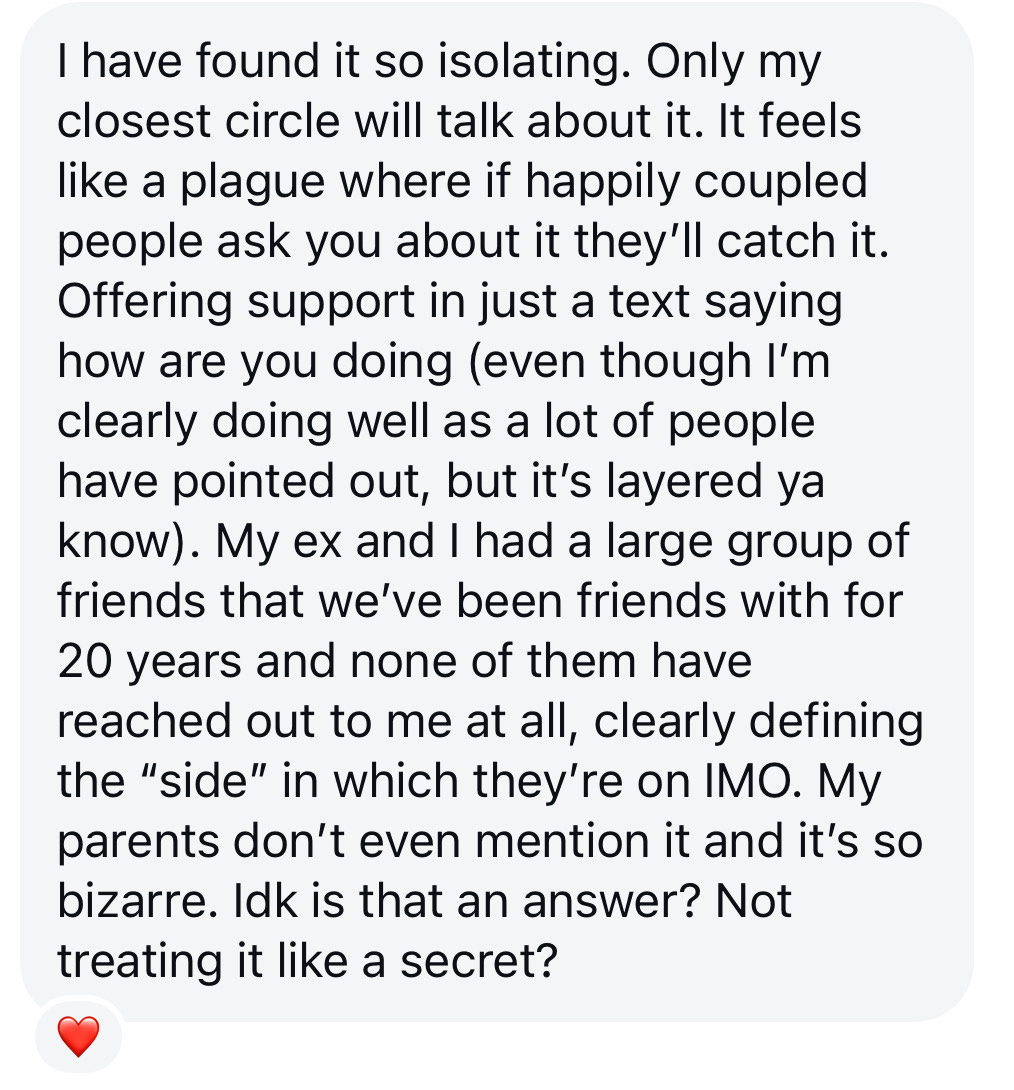Wondering how to support a friend or loved one navigating one of life’s most commonplace tragedies? Splits range from being categorically good (many people will be offended at the mere offering of condolences), necessary neutral to necessary sad, and catastrophic.
Regardless of the details, the dissolution of a marriage is always at least one thing- a pain in the ass. They require a massive reorganization of nearly every facet of your life. There are assets to be split, friends to sort, possessions to divide, insurances of every kind to modify, emergency contacts to update. And oh, the children.
Divorce is marked by endless loss and ceaseless tasks. With no mention at all of the emotional implications, the errands and paperwork alone are enough to cripple even the most “capital A” Adult.
Nearly half of first marriages will end and yet we don’t have the skills to navigate this transition well. Informed by my own personal suffering and suggestions from my online community, I have compiled a list of recommendations if you’re on the observer side of things. Numeric lists throughout are reader submissions.
Say something. Really. Acknowledge what is happening in your friend’s life. People love to avoid the topic or ghost. I’ve heard from dozens of people who said it would have really meant a lot to have the people in their lives simply mention what they were going through (from in-laws to neighbors).
Divorce doesn’t need to be weird, but people are really good at making it awkward. Here is a little script:
“I wanted to reach out and tell you I've been thinking about you. I know a life change like this can be overwhelming. I’m here for you.”
Depending on the nature of your relationship you might be more specific in the support you offer. That might look like:
Offering to get together for coffee or dinner and making a plan. If they have children, you might suggest a playdate. If you are particularly close to them or your children are friends, you might offer to have their children over for a few hours.
People are not good at accepting help, none of us like to be a burden, so you might reach out with a classic options list (this was popularized for postpartum support, and I think it’s a great method to implement when people are going through anything at all):
“I’d love to spend time with you or be of help in some way. I know it can be hard to accept support, so why don’t you choose one and let me know! 1) If you’re emotionally exhausted and don’t have the energy to engage. I drop off dinner. 2) We go out. 3) We get the kids together.” You know your people better than me, so adjust accordingly.
Don’t say anything. Unless your friend has explicitly told you that they want to receive updates and gossip about their former partner, don’t share it. They don’t need to see their ex’s Hinge profile, hear about their dating escapades, or know about the recent photos you saw of them with a new partner. These things can be painful and triggering and it’s best to only offer information that’s directly requested.
Showing up. Divorce can be incredibly lonely, many people lose part or all of their community and support system. It can be hard to navigate social spaces that are typically arranged around couples- I'd encourage you to continue to include your friend and extend invitations to gatherings. This is one of the most submitted pleas. People going through divorce are longing for connection.
Many suggested the following:
Come over in sweats, make me go for a walk.
My friends would just insist on coming over and bring wine/pizza/food.
Going for coffee and really listening to why you’re getting divorced.
Check in via text. Repeatedly. It can feel too needy to reach out.
Coming to my house to offer emotional support as I purge/go through difficult things.
An open invite to be the third wheel.
Something to do when I don’t have the kids to distract me from the heartbreak.
“I’m bringing pizza, you can’t say no, what night?”
A standing invitation to family dinner, once a month or whatever can be accommodated. Something to count on.
Don’t leave them out of group events because they are no longer coupled.
Check in to see if they have plans for the holidays and extend an invitation.
Invite them over to dinner with their kids and when they don’t have them.
Show love to my kids, take the pressure off of me if able, because I can’t be the “fun” one a lot due to overwhelm.
The separation and divorce process can take a long time, and the adjustment and healing period can extend for months, into years. Most people need support even after things are officially over, and many people navigate this without family.
A divorce registry. We are all familiar with wedding and baby registries, but in more recent years showers for other major life events have become popularized. It’s lovely to receive gifts during a time of celebration- but you really need your people to show up for you when you are going through a major change that is often accompanied by financial strain and new expenses.
A divorce registry was not on my radar until a friend suggested it to me and the burden it relieved (emotionally and financially) cannot be properly articulated.
I weep when I think of how so many people eagerly supported me and my daughters. I wish every person navigating divorce was blessed in this way.
There can be a great deal of shame attached with expressing financial need and a wonderful way to help a loved one is to encourage them to set up a divorce registry, sitting with them as they go through the process, and sharing it with friends, family, your church community, and on social media.
I used Fresh Starts Registry, it is simple to use and the website offers a host of other information and helpful resources - ranging from step-by-step guides to navigating divorce and scripts for how to approach the topic with the people in your life.
Celebrate or observe. After my close friend’s divorce was finalized, we took a girl’s trip to Vegas. We ate, drank, and laid in the sun. We ushered her into a new beginning. I was happy to be by her side for that and thought that when my divorce was finalized, I might want to honor the end of my marriage in a similar way. When my legal proceedings were over, I did not feel celebratory. I felt hollow and sheepishly tender, and I knew a party wasn’t what I needed.
Give your friend space to have a wide range of feelings on and around the “day of.” Reach out to them on D day and check in. Ask ahead of time if there’s anything they want to do. Whether it’s dinner, a party, or a trip- your friend will appreciate your presence and thoughtfulness around such a significant life event.
Thoughtful gestures.
Drop off a small gift on firsts, Christmas, Mother’s/Father’s Day, birthdays.
Occasional snail mail or dropping off a card or activity for the kids.
Drop off a meal.
Gift certificate for house cleaning.
A divorce box full of goodies- mug, socks, book, tea, wine, snacks, cozy pajamas. Could also do for the kids.
Door Dash, Uber Eats, coffee gift card. Most of these can be sent by e-mail with a note and it’s so nice to receive and know you’re being thought of.
Bring coffee, fold laundry, hang out.
Offering to help fix things in my home, mowing my lawn, assistance with “male coded” tasks.
To proactively offer to help with the kids or take them somewhere fun.
Organize a meal train.
Gift cards for necessities like gas and groceries.
Drop food or a gift off without obligation of an interaction and text to say you left it at their door.
Being a good friend.
Don’t feed the gossip loop, be a protector/defender, be present.
My best friend allowing me to talk ad nauseam about the same things as I processed the loss.
Validation that your decision is yours and doesn’t have to make sense to anyone else.
Just saying that you don’t judge them and not telling them to fight and pray.
While we were cohabitating, my friend would invite me to stay at their house on my “off” weekends and that was lifesaving.
Non-judgmental listening.
My loved ones reminded me of all my wonderful traits, most of which my ex denied.
Upon seeing the divorced person asking upfront if they would like to talk about it or not.
Their “bad” is bad enough.
Believe what they tell you of their marital experience.
Financial, legal, and practical support.
Encourage them to explore their options and set up free consultations with legal representation.
Connecting them with a trusted financial advisor, divorce attorney, or mediator if needed.
Help setting up their new living space, assembling furniture, hanging pictures.
Assistance with moving day logistics, offering a vehicle, muscle.
Basic toolkit as a housewarming gift.
Ring camera for door as a gift to provide a sense of safety.
Help with school pick ups.
Be an adult. You can be a loyal friend or family member, while treating the other party with respect and kindness. If you’re someone who has ties or a relationship to both parties, your friend might be experiencing some anxiety about losing the friendship. In most cases, involving emotionally mature adults, it is *insane* to pick sides. This is a very weird energy! Don’t do this. If you have been on the periphery, there’s no reason that you shouldn’t extend warmth to both people.
Smile, say hello if you run into them in public.
If you are closer to one of the individuals, you can honor the primary friendship by showing kindness to the other person but not engaging in conversation about the divorce, coparenting, etc.
We don’t need to be a society that fails people in divorce. We can move beyond the good guy/bad guy narrative, resist the need to assign blame and judgment and walk alongside families during a challenging transition. We can show love, care, and extend support to friends when they need it most and help ensure that they aren’t burdened by shame and left alone in the emotional wreckage of divorce.
Leave a comment and share what support you needed most during your separation and divorce. Feel free to share any books, podcasts, or resources you found helpful.





